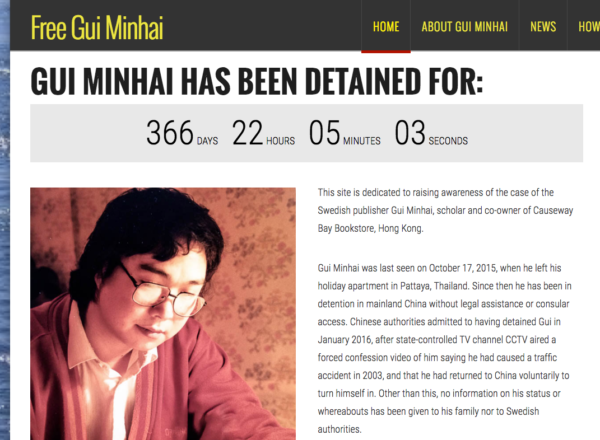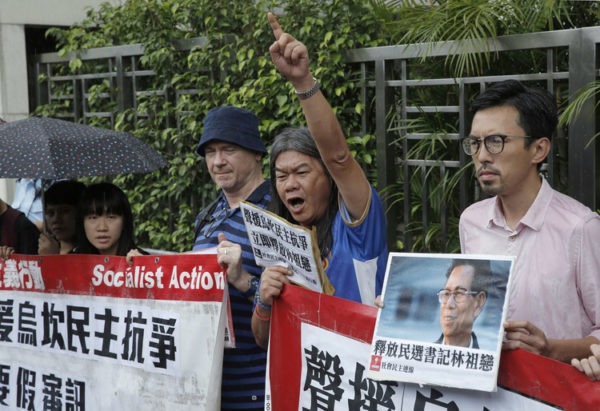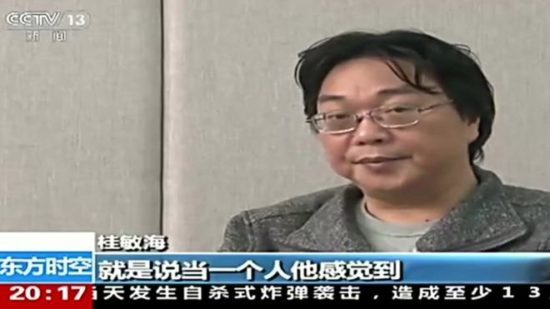Criticism of foreign governments’ inactivity and connivance as China’s crackdown ‘goes global’
Adam N. Lee, chinaworker.info
A year has passed since Gui Minhai disappeared in Thailand, on 17 October 2015. Gui, a Swedish citizen, is one of five Hong Kong book publishers who were all captured separately and detained in China.
Their case has shaken the China-ruled territory, underlining Beijing’s erosion of Hong Kong’s political freedoms and limited democratic rights. A recent poll by the University of Hong Kong Public Opinion Programme shows public confidence in Hong Kong’s media and media freedom has fallen to its lowest level in 23 years. Politically, the kidnappings undoubtedly influenced recent elections in Hong Kong and the powerful growth of pro-independence sentiment. They also showcase the growing overseas reach of the Chinese dictatorship not only in Hong Kong but further afield.

Gui and his four colleagues ran the book company ‘Mighty Current’ from Hong Kong, publishing books critical of top Chinese leaders including a book about the vast family fortune of current ruler Xi Jinping. Their literary activity was fully legal in Hong Kong, and should therefore be protected under its so-called ‘One country, Two systems’ formula of political autonomy. China’s state security and police forces are banned from operating in Hong Kong. Yet following their extra-judicial disappearance, Gui and his colleagues now face punishment in China for distributing “illegal” publications.
Three of the group were apprehended while visiting mainland China, but Gui and his colleague Lee Bo, a British citizen, were illegally ‘renditioned’ by Chinese security agents with the connivance of the governments of Thailand and, in Lee’s case, Hong Kong. The Thai military junta has shifted closer to the Chinese regime since the country’s elected government was overthrown in 2014. The Thai government told Swedish authorities there is no record of Gui legally leaving Thailand. It is therefore reasonable to conclude, as the Swedish newspaper Expressen does, that Gui was smuggled over the border to Cambodia – ruled by an even closer Chinese client regime – and from there flown to China. This method, in flagrant violation of international law, replicates those used by US undercover forces against international ‘terror’ suspects.
China’s arrest of Peter Dahlin marks ominous new stage in crackdown
Crackdown goes ‘global’
As chinaworker.info has pointed out, Gui’s case and other recent cases mark the ‘globalisation’ of Xi Jinping’s campaign of repression – the most severe in a quarter century. The Chinese state is believed to have abducted political dissidents in Myanmar (16-year-old Bao Mengmeng, the son of an arrested rights lawyer) and Laos (dissident journalist Li Xin), as well as in Thailand in the recent period. Both Malaysia and Kenya have this year deported dozens of Taiwanese nationals suspected of fraud, not to their home country, but to China, despite protests from Taiwan’s government. Earlier this month, the Hong Kong student activist Joshua Wong was detained and refused entry to Thailand, with the Thai authorities stating this was at China’s request.
“China is exporting its paranoia and its poor practices – disappearances, arbitrary detention and censorship of dissent. This is a worrying sign for activists and organisations throughout Asia and beyond,” said Sarah Brooks, Asia Program Manager at the International Service for Human Rights (ISHR).
Gui Minhai’s daughter Angela, who has been campaigning on her father’s behalf, has set up a website to publicise facts about the case and pressure foreign governments to pursue the case more vigorously. There is growing concern among journalists and human rights activists in Sweden that its Social Democratic-Green government has done far too little to pressure the Chinese regime over the illegal detention of one of its citizens. One year after his disappearance, Gui is still not formally charged with any crime! Neither Sweden’s representatives nor his daughter have been told where Gui is being held. On both counts this is a violation of the dictatorship’s own legal rulebook as well as international agreements.
“The Swedish government hasn’t given Gui Minhai’s case enough importance,” says Sweden-based dissident Da Hua. “They want to maintain their profitable business links with the Chinese regime and therfore issues like freedom of speech and the kidnapping of a Swedish citizen are being toned down,” he told chinaworker.info.
An example of this is the delegation of 30 Chinese corporate leaders who held talks with the Swedish Prime Minister Stefan Löfven on 12 September at the government’s Stockholm headquarters Rosenbad. If the Swedish government was serious, even about demanding an explanation from the Chinese authorities about why and where Gui is being held, it would announce the cancellation of all such official meetings. Like other European governments, guided by profit interests, it is clearly not prepared to take this approach.
Hong Kong: Kidnapped bookseller breaks silence
Trial by television
In January, Gui Minhai was paraded on state television making a ‘confession’ to a decade-old traffic offense and telling foreign governments and media not to ‘meddle’. Angela Gui notes that her father’s tee shirt appears to change colour during the film. One of Gui’s fellow booksellers, Lam Wing-kee, the only one to escape from China’s grip and currently living in fear for his safety in Hong Kong, revealed how his own filmed ‘confession’ was enacted – with a script and even a director who made him retake certain parts again until satisfied with the quality!
“Trial by television” is now an established method of Xi’s crackdown. Despite growing numbers who are sceptical towards these ‘confessions’, they serve as a deterrent to others. Often family members are held as hostages, as in Imperial times. This is also why whole groups are being arrested in coordinated sweeps – rights lawyers, NGO activists, and the five Hong Kong publishers – to maximise the coercive effect on individuals held in isolation and refused access to a lawyer to take part in filmed ‘confessions’. The political purpose – to spread terror among regime critics – is not so different from terrorist groups making videos of their captives before executing them. Human rights lawyers, hundreds of whom were rounded up in July 2015, were similarly forced to make filmed ‘confessions’ which were then used as the main evidence to convict them.
Another recent victim of these gangster methods is Lin Zuluan, the 72-year-old elected leader of the Wukan village council, who has been jailed for over three years on trumped-up corruption charges. Lin recently retracted his televised ‘confession’ and mounted an appeal which unfortunately has little chance of success under the regime-controlled court system.
In Lin’s case, as with several of the detained lawyers, ‘confessions’ were extracted after family members (Lin’s grandson) were seized and threatened with similar trumped-up charges. This shows how the Chinese regime is increasingly ruling through a system of judicial frame-ups and state terror aimed at eradicating all elements of opposition. As its economic woes deepen this trend is growing.
The case of Gui Minhai shows that the struggle to expose the gangster methods of the Chinese dictatorship and build pressure in support of its many victims must be stepped up. Capitalist governments have shown that they rank ‘corporate rights’ far higher than ‘human rights’. A big part of the coming struggle is to increase pressure from below – from the workers’ movement and ordinary people – upon these governments and their billion-dollar deals with brutal authoritarian regimes.
chinaworker.info says
- Release Gui Minhai and all political frame-up victims in China!
- Resist and expose the Chinese dictatorship’s gangster methods: extra-judicial detentions, kidnappings, forced confessions and hostage-taking!
- Increase the pressure on foreign governments – democratic rights and human rights before corporate rights!
- Down with one-party dictatorship!





